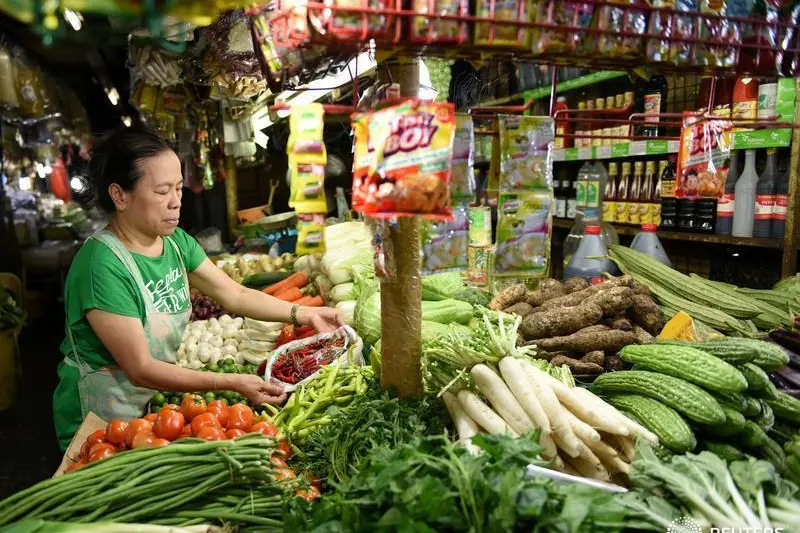PHOTO
MANILA - In hundreds of hours of speeches during his nearly two years in office, Philippine President Rodrigo Duterte has rarely talked about the economy, something he says is best left to the “clever guys” in his cabinet.
So he raised a few eyebrows when he told central bank officials last month after the government announced an inflation spike to “remain vigilant in ensuring price and financial stability”.
Duterte was speaking just days after the government said inflation rose for a fourth successive month in April to hit a five-year high of 4.5 percent, affecting growth in what has for more than six years been one of Asia’s fastest expanding economies.
What may have been of concern to Duterte was that many people have blamed rising prices on a new tax bill his government has implemented to raise funds for a massive $180 billion infrastructure building plan, a rare disapproval of the administration.(Graphic: Duterte government scorecard - tmsnrt.rs/2L8YxDE)
“This year is all about the poor’s rising cost of living, perceived to be triggered by the TRAIN law,” said Victor Manhit, president of private think tank Stratbase ADR Institute.
TRAIN is the Tax Reform for Acceleration and Inclusion law, which took effect in January and saw excise taxes raised on fuels, levies on sweetened beverages and lowered some personal income taxes, among other measures.
A survey by Social Weather Stations published last month showed only six percent of Filipinos approved of the government’s handling of inflation, a massive 18-point slump from the previous quarter, and its first single-digit rating in any category.
While Duterte has been condemned abroad for his indifference to thousands of deaths in his brutal war on drugs, he has so far been enjoying consistently high ratings in opinion polls for fighting crime, illegal drugs, terrorism and graft.
But a survey published by pollster Pulse Asia in April showed the most urgent issues for Filipinos were wages, inflation and poverty.
“Inflation has never been a direct factor in political popularity. But if public perception is that the government is not doing anything about it, then it becomes a problem, it becomes political,” said Ramon Casiple, a well-known political analyst.
ANXIETY BUT NO ANGER
There have been no signs of public anger about inflation, but some people are getting anxious.
“I hope Duterte can fix this. Inflation has eaten into our profit,” said Orlando Cristobal, 56, who runs a food delivery business and had just bought a few kilogrammes of rice and fish at one of Manila’s biggest markets.
His wife, Elizabeth, worries they’ll lose customers if they pass on their costs.
“We used to earn 500 pesos ($9.50) a day,” she said. “Now we’d be lucky if we’d be left with 200.”
Inflation has exceeded the government’s 2-4 percent target range, and its impacts could be far-reaching. First quarter growth fell short of the 7-8 percent goal after inflation weighed on consumer spending, which makes up about seven-tenths of the economy.
The central bank raised interest rates for the first time in more than three years on May 10 to try to head off climbs in inflation and oil prices.
Economic planning minister, Ernesto Pernia, said Duterte was aware that prices mattered most to the public.
“He is worried”, he told Reuters. “He was concerned about inflation, because it affects the poor.”
Duterte’s ambitious economic agenda is geared towards the poor and at the heart of it is the massive plan to overhaul roads, ports, railways and airports - which would create jobs, attract more investment and boost competitiveness and domestic spending.
(Graphic: Philippines' key economic indicators' performance since 2000 - tmsnrt.rs/2nZqDWx )
The government calls it “Dutertenomics”, and the TRAIN law was intended to at least partially fund the initiative.
Now, the big challenge for Duterte’s government is ensuring that a plan geared towards helping his political base doesn’t end up alienating it.
“This is the greatest challenge to the president specifically since Dutertenomics is built around the promise of inclusive growth,” said Manhit, from the Stratbase ADR Institute.
Some opposition lawmakers have started to call for the law to be repealed, or adjusted if inflation gets too high.
Duterte’s economic managers have taken turns to defend TRAIN, insisting that while it may have contributed to inflation, a jump in world oil prices, a weak peso currency and a shortage in state-subsidised rice were the main culprits.
In a rare comment about TRAIN, Duterte on Wednesday accepted that it was driving inflation, and that he might have to pursue alternative means of financing, and would settle for making a “modest improvement on what we have now”.
“I need money also to run the country, if you do not give it, fine,” he said in a speech.
“But with the limited resources of our country, there are many who are willing to help.”
($1 = 52.6110 Philippine pesos)
Editing by Martin Petty and Raju Gopalakrishnan
© Reuters News 2018





















